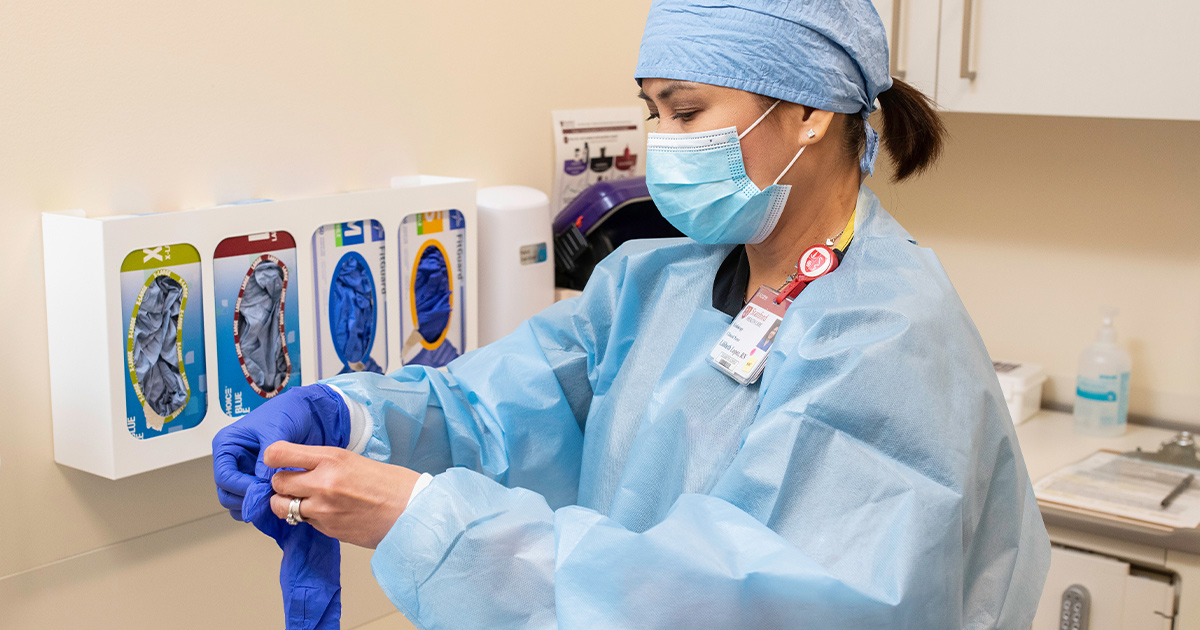Neurosurgery Program
Part of Stanford Health Care Neuroscience

Leaders in Neurosurgery
Stanford Medicine Neurosurgeons are renowned for their pioneering care of people affected by conditions of the brain, spine, spinal cord, and peripheral nerves.
They apply the most advanced technologies and expertise through more than 4,000 operations each year -- while they work tirelessly and comprehensively to support the resilience and recovery of each patient.
What We Offer You for Neurosurgery
- Pioneering surgical care for complex neurological conditions, including brain tumors, epilepsy, conditions of the spine, trauma to the spine, and stroke. Go to Conditions Treated
- Personalized treatment using the most advanced technology and emphasizing minimally invasive approaches to help speed healing. Go to Treatments
- A team of specialists working together to guide you through all aspect of your care. Go to Your Care Team
- In-person or video visits to our conveniently located, state-of-the-art clinic. Go to Accessing Care
- Assistance from our International Medical Services team to plan your travel and accommodations
While we're known around the world for treatment of rare disorders, we treat all neurological conditions and welcome the opportunity to support you.
Our doctors and supportive care specialists work closely with you to outline a treatment plan designed to help treat your symptoms and restore your quality of life.
Within our center, we have teams that specialize in distinct neurological conditions:
Brain, Spine, and Skull Base Tumors
Our world renowned surgeons treat cancer and benign tumors of the brain, spinal cord, skull base, and spine in adults and children.
Epilepsy
Our surgical epilepsy program is part of Stanford's Level 4 Epilepsy Center, the highest-level designation awarded to epilepsy centers around the country, allowing us to treat the most difficult forms of epilepsy for both children and adults.
Essential Tremor & Parkinson's Disease
Our surgeons are experts in the treatment of movement disorders and are at the forefront of using technologies such as focused ultrasound and deep brain stimulation to successfully treat patients with essential tremor.
Head and Spine Trauma
To treat adults and children with conditions ranging from mild head trauma to complex spinal injuries, our experts provide comprehensive care, including neurosurgery.
Moyamoya and Vascular Diseases
For nearly 30 years, patients and families have traveled from all over the world to see the highly experienced group of professionals in the Stanford Health Care Moyamoya Center.
Peripheral Nerve
Our expert team provides care for the broad spectrum of peripheral nerve disorders including injury, nerve sheath tumors, carpal tunnel and rare conditions like neurofibromatosis.
Spine
The experts at the Stanford Medicine Spine Center treats all spinal conditions involving the spine, back, head, neck, and nervous system. We manage chronic, long-term issues, as well as acute problems that come on suddenly.
Stroke
Our Stroke Center was the first comprehensive organization in the United States focused on stroke diagnosis, treatment, research, and education.
Trigeminal Neuralgia
Our Trigeminal Neuralgia Program brings together neurosurgeons, head and neck surgeons, neurologists, radiologists, psychiatrists, and pain management specialists to provide leading-edge treatment options based on the latest research findings. Our leadership in innovation and clinical research helps us get one step closer to finding long-term, safe, and minimally invasive solutions for patients suffering from trigeminal neuralgia and chronic facial pain.
Our team specializes in delivering innovative, treatments, even for conditions once thought to be untreatable. Our doctors actively research new approaches to neurosurgery and use their research discoveries to improve your treatment options.
We offer the full range of treatments and use the latest technology, always emphasizing the most conservative approach, including noninvasive and minimally invasive techniques whenever possible.
As with our condition-specific programs, our center also has a number of state-of-the-art treatment-specific programs, each with a dedicated, highly trained staff.
Programs
Brain & Spinal Tumor
Our world-class experts have specialized training and experience in treating even the most complex spine and brain tumors. You receive personalized, compassionate care with treatments that use the latest advancements for the best possible results.
Cerebrovascular Neurosurgery
Stanford Medicine is the largest moyamoya referral center in the world, specializing in complex neurovascular disorders of the brain and spinal cord. A multidisciplinary team consisting of cerebrovascular neurosurgeons, interventional neuroradiologists, stroke neurologists, and radiation oncologists, collaborate closely to design individualized treatment plans combining optimal therapies for each patient’s unique needs.
Cyberknife Stereotactic Radiosurgery Program
Globally recognized for the invention of the Cyberknife, the Stanford Healthcare Cyberknife Stereotactic Radiosurgery Program brings together expert neurosurgeons, radiation oncologists, and physicists, to continue development of innovative stereotactic radiosurgical technology and techniques. Our team focuses on the development, implementation, and clinical testing of these minimally invasive surgical tools for a variety of tumors.
Functional Neurosurgery
We focus on research for a variety of treatments for movement-related disorders, pain, and epilepsy. Many of the therapies utilize the stereotactic neurosurgical techniques developed at Stanford Health Care.
Neurogenetic Oncology
Our Neurogenetics Oncology Program is among a select group of programs worldwide that offer extensive expertise and experience in caring for patients with rare and difficult neurogenetic disorders.
Peripheral Nerve Surgery Program
Stanford Health Care Peripheral Nerve Surgery Program offers comprehensive diagnostic evaluation and testing, as well as leading-edge surgical techniques, provided by a highly specialized and experienced nationally-recognized team.
Pituitary Center
The Pituitary Center provides comprehensive, multidisciplinary, and streamlined care for the evaluation and treatment of pituitary tumors and other neuroendocrine disorders.
Skull Base Surgery Program
Our Skull Base Surgery Program offers state-of-the-art, minimally invasive surgery for skull base disorders. Our multidisciplinary team of world-renowned experts performs gentle and accurate surgery for even the most complex skull base lesions. We offer advanced surgical treatment options including endoscopic endonasal surgery, minimally invasive keyhole surgery, transcranial microsurgery, transtemporal skull base surgery, and more; and our experts are available for remote consultation.
Stanford Medicine Spine Center
The Stanford Medicine Spine Center is staffed by world-class spine specialists from neurosurgery and orthopaedics, who work together to offer you the world’s most advanced and effective treatment options – including those that don’t involve surgery. Our goal is to get you back to your normal lifestyle as soon as possible, and maintain long-term spinal health.
Trigeminal Neuralgia Center
Trigeminal Neuralgia Center We bring together world-leading neurosurgeons, neurologists, radiologists, pain management specialists, psychiatrists, and other professionals to deliver the most advanced diagnostic and treatment options based on the latest research findings.
Clinical Trials
Our specialists deepen the understanding of neurosurgery through research and clinical trials. These studies evaluate new medical techniques and technologies to diagnose, treat, or prevent neurological disorders. As a Stanford Health Care patient, you have access to these exciting new approaches.
Open trials refer to studies currently recruiting participants or that may recruit participants in the near future. Closed trials are not currently enrolling, but similar studies may open in the future.
Your Care Team
Neurosurgery specialists excel in the surgical treatment of neurological conditions. Our team members are highly trained and experienced in providing advanced care for a wide range of disorders, such as brain cancer, dementia, epilepsy, and Parkinson’s disease. Our doctors also help define national protocols for the surgical treatment of neurological disease through their clinical research and active participation in national medical associations.

Your Doctors
Neurosurgeon
Our team of internationally renowned neurosurgeons is one of the largest in the nation. We have specialists in almost every condition affecting the brain, spinal cord and nerves -- one of the most complex and critical systems in the human body.
View All {0} NeurosurgeonsStanford is an Academic Medical Center, which is a type of hospital setting where doctors teach the entire spectrum of medical education. Students range from beginning medical students to fully licensed and practicing doctors completing advanced sub-specialty training. Stanford Medicine is a partnership between Stanford University School of Medicine and Stanford Health Care. Since Stanford is a teaching hospital, you can expect to meet many providers and providers in training.
- Attending Physician: a doctor who supervises doctors in training or in medical school
- Fellow: a doctor doing postgraduate level work and specializing in care of patients with specific conditions
- Resident: a doctor who has graduated from medical school and is in training (also called “residency”) here at Stanford. A resident is also called an intern
- Medical Student: a student who is currently enrolled in medical school with the goal of becoming a doctor

Extended Care Team
Advanced Practice Providers (APPs)
Our skilled physician assistants (PAs) and nurse practitioners (NPs) have special training in diagnosing and treating neurological diseases. They see patients independently as well as with a doctor. APPs can give you an exam, write prescriptions, and help prevent or treat many issues.

Support Services
Healing isn't confined to the operating room. We offer a broad array of supportive services to help you get back to your life and routine.
The Stanford Medicine Neuroscience Health Center brings together world-class specialists in neurology, neurosurgery, and interventional neuroradiology. Using the most advanced treatments, diagnostics and imaging technologies, we address your unique needs in the comfort and convenience of a single location.
We provide care for adult patients. Working collaboratively with Stanford Children’s Health pediatric neurosurgery unit, we also provide a seamless patient care experience for adolescent patients as they transition to adult care.



